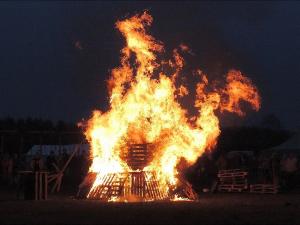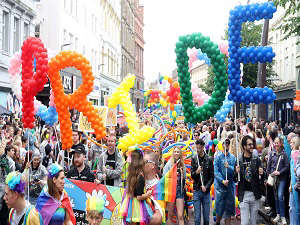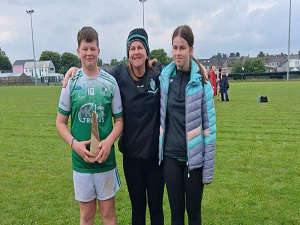
By Deborah McAleese
Police in Northern Ireland have warned their resources could be stretched amid growing fears of tension around the burning of Eleventh night bonfires.
A controversial High Court ruling has ordered that no more materials are added to loyalist bonfires at four sites in Belfast amid health and safety concerns.
Sinn Fein has said they believe that all dangerous materials should be removed from the sites in the east of the city by police and the council.
However, unionists have accused the republican party of waging a "cultural war" on loyalists.
In a joint statement the Democratic Unionist Party (DUP) and Progressive Unionist Party (PUP) said there has been an attempt to "discredit" the Twelfth celebrations and called for calm.
A prominent loyalist - former flag protester Jamie Bryson - warned that it could prove difficult "to control young people" if action is taken to remove their bonfires.
Chairman of the Northern Ireland Police Federation Mark Lindsay said he hoped "those involved are able to sort out outstanding issues."
He warned: "What we don't want is a drain on already stretched resources."
Bonfires are traditionally lit in loyalist areas of Northern Ireland on the eve of the annual July 12 celebrations marking King William III's victory at the Battle of the Boyne in 1690.
In recent years there has been concern over the size of the bonfires, many of which are built close to homes and businesses.
In Carrickfergus, a towering bonfire, which has been built in close proximity to a petrol station, looks close to toppling over.
In Belfast the city council was granted an injunction on Friday by the High Court preventing more materials being added to four loyalist bonfires.
The council said the injunction was applied for amid concern about the size of the bonfires at Ravenscroft Avenue car park/Bloomfield walkway, Avoniel Leisure Centre car park, Inverary playing fields and Cregagh Park East.
Alliance and Sinn Fein councillors have claimed that the application for the injunction was supported by all the political parties.
The Democratic Unionist Party, Ulster Unionists and Progressive Unionist Party have not responded to the claim.
Sinn Fein councillor Jim McVeigh sparked anger within the unionist and loyalist community on Monday when he said that his interpretation of the injunction was that the bonfires should not be lit and the material removed from the site.
"They are already too high, too dangerous and too close to public amenities," he said.
Mr McVeigh claimed that the council has a contractor to go onto the sites and remove bonfire material.
However, Belfast City Council would not confirm the claim.
In a statement a spokesman for the council said: "We have a contractor who carries out work at numerous sites but we cannot comment any further due to a confidentiality clause."
The spokesman also said the injunction does not make any specific reference to the lighting of the bonfire.
"The Council will review any information received -either directly or via the police -relating to any persons allegedly breaching the injunction, and will consider what further action is appropriate," the spokesman added.
The Alliance party's Chris Lyttle said the bonfires "should have been prevented long before now".
"The bonfires need to be made safe by whatever measures the statutory authorities have available to them. Ideally they would be voluntarily reduced," he added.
In their statement the DUP and PUP called for a Cultural Convention to be held in the Autumn" to ensure that the Unionist Community can go forward with one voice in promoting our culture, heritage and tradition, as well as to ensure that our celebrations continue to be bigger, better and more successful than ever before".
They added: "We must not let our unity of purpose be disrupted or harmed by the actions of those who want to devalue and demean us.
"It is our belief that this continued aggression by Sinn Fein and their continuation of a cultural war, is a vain attempt to give their ageing leadership a legacy and to restore their credibility within their own ranks."
Dr Jonny Byrne, lecturer in criminology at the University of Ulster, said the fallout is "symptomatic of our inability to deal with contentious issues."
He added: "What history tells us is that a law and order approach to sensitive cultural issues creates more problems."


 Mother and two children murdered in Maguiresbridge to be buried together By Jonathan McCambridge and Rebecca Black, PA
Mother and two children murdered in Maguiresbridge to be buried together By Jonathan McCambridge and Rebecca Black, PA
 Surgeon tasked with tackling waiting lists says they are a ‘national shame’
Surgeon tasked with tackling waiting lists says they are a ‘national shame’
 First Minister disappointed to not attend Belfast Pride this year
First Minister disappointed to not attend Belfast Pride this year
 Crowds expected at vigil for mother and children killed in Co Fermanagh shooting
Crowds expected at vigil for mother and children killed in Co Fermanagh shooting